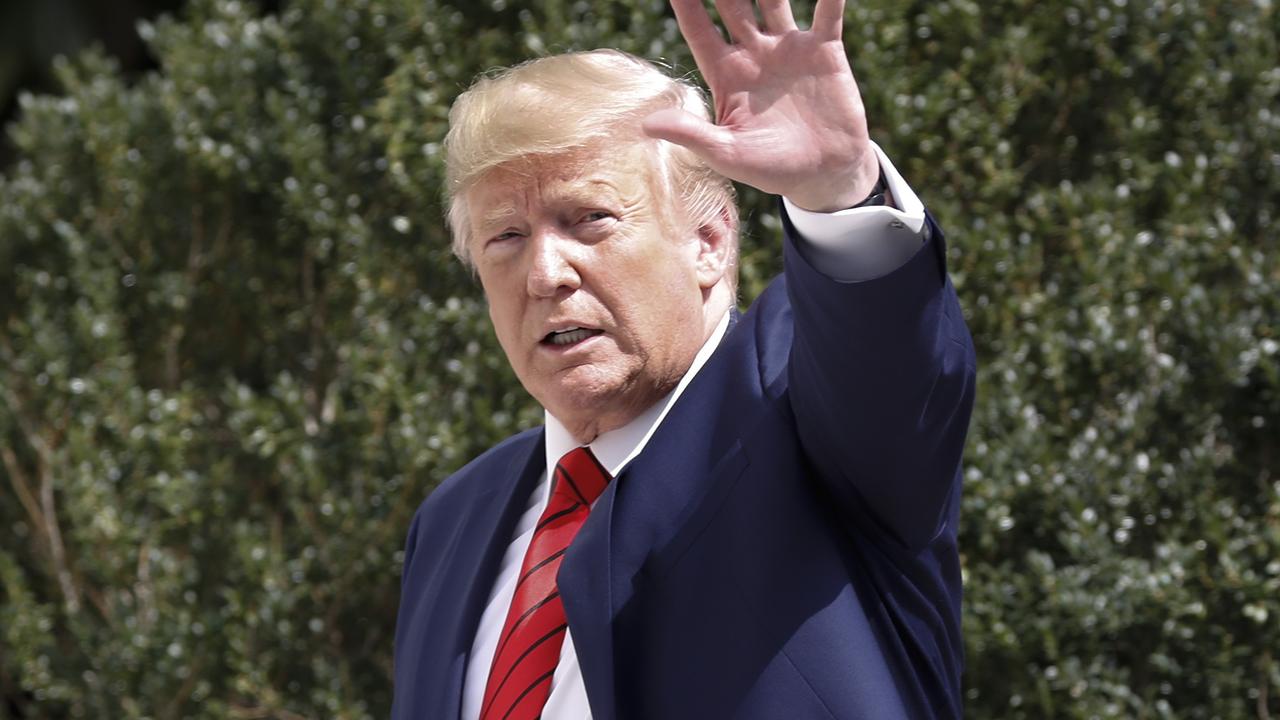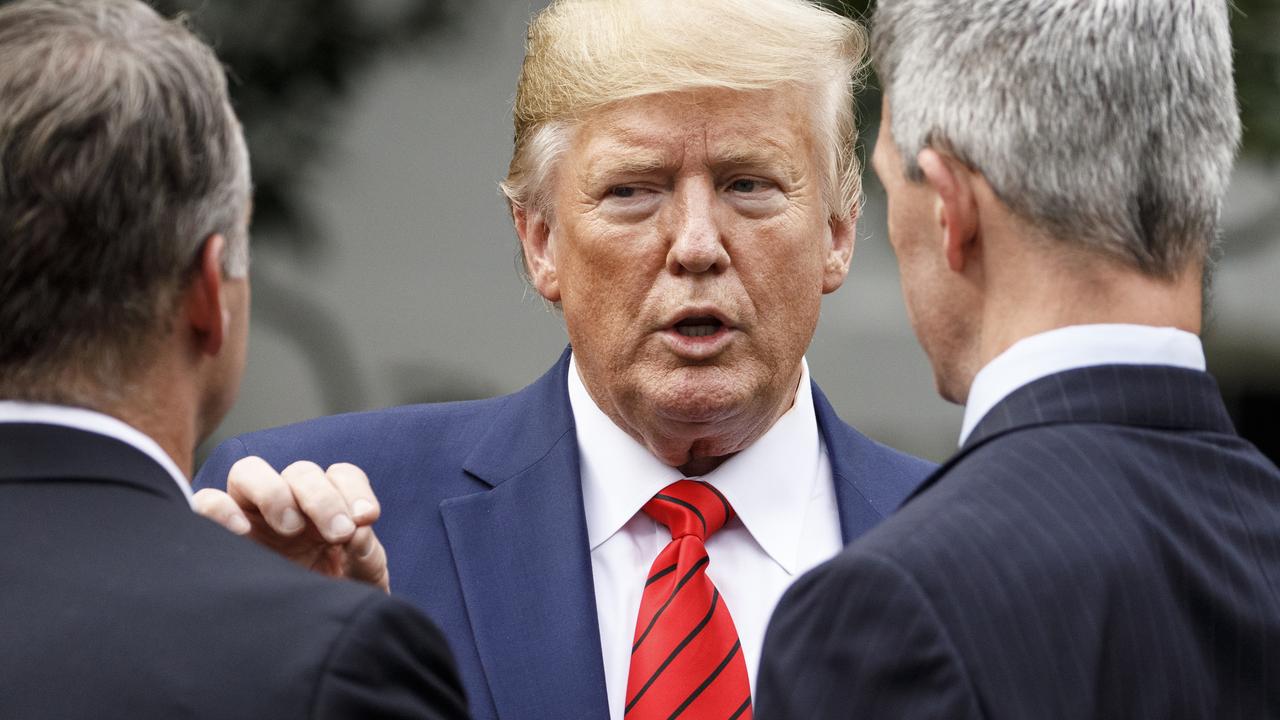The most important sentence in the Trump whistleblower’s report
The whistleblower report on Donald Trump contains one particularly telling admission that will change how the investigation proceeds.
The whistleblower report on Donald Trump, released overnight, contains one particularly intriguing admission.
The US intelligence official who lodged a complaint about Mr Trump’s interactions with Ukraine — including his pivotal phone call with President Volodymyr Zelensky — did not actually witness the conversation.
RELATED: Whistleblower report released to the public
RELATED: One killer line in the explosive Trump transcript
“I was not a direct witness to most of the events described,” wrote the whistleblower, a CIA officer who once worked at the White House. Their specific identity has not been revealed.
At first glance, that looks like good news for Mr Trump. His defenders have certainly pounced on it, brushing off the complaint as “hearsay without first-hand knowledge”.
They are being shortsighted. The whistleblower’s lack of first-hand knowledge is actually the most dangerous fact in the entire report. It’s a sign that Mr Trump is in even deeper trouble than we thought.
If the whistleblower were one lone, disgruntled official, it would be reasonably easy for Mr Trump to portray them as politically biased, discredit them and move on with his life.
That isn’t the case. We are actually talking about a number of Trump administration officials here, all of whom raised concerns about his conduct with the whistleblower in question.
That makes the complaint a road map for Democrats investigating the President. It points them in the direction of additional witnesses who can shed more light on his behaviour. Therein lies the danger.

In the report released overnight, the whistleblower says “more than half a dozen” US government officials provided them with information about Mr Trump “using the power of his office to solicit interference from a foreign country” in next year’s presidential election.
“This interference includes, among other things, pressuring a foreign country to investigate one of the President’s main domestic political rivals,” the report reads.
The central allegation is that Mr Trump pressured Ukraine to dig up dirt on Joe Biden, who is currently the frontrunner for the Democratic presidential nomination.
“The information provided herein was relayed to me in the course of official interagency business. It is routine for US officials with responsibility for a particular regional or functional portfolio to share such information with one another in order to inform policymaking and analysis,” the whistleblower says.
“I found my colleagues’ accounts of these events to be credible because, in almost all cases, multiple officials recounted fact patterns that were consistent with one another. In addition, a variety of information consistent with these private accounts has been reported publicly.”
It is clear, from the subsequent pages, that the whistleblower’s sources are well-placed and their information is accurate.
How do we know that? Because the whistleblower — who, I repeat, did not witness Mr Trump’s phone call with Mr Levensky — nevertheless correctly describes three key details from the conversation.
They say Mr Trump pressured the Ukrainian President to:
• “Initiate or continue an investigation into the activities of former vice president Joseph Biden and his son Hunter Biden.”
• “Assist in purportedly uncovering the allegations of Russian interference in the 2016 US presidential election originating in Ukraine, with a specific request that the Ukrainian leader locate and turn over servers used by the Democratic National Committee and examined by the US cyber security firm CrowdStrike.”
• “Meet or speak with two people the President named explicitly as his personal envoys on these matters, Mr (Rudy) Giuliani and Attorney-General (William) Barr, to whom the President referred multiple times in tandem.”
We have seen the official transcript of the call. Those three things all happened, exactly as the whistleblower describes.
“The White House officials who told me this were deeply disturbed by what had transpired in the phone call. They told me there was already a ‘discussion ongoing’ with White House lawyers about how to treat the call because of the likelihood, in the officials’ retelling, that they had witnessed the President abuse his office for personal gain,” they say.

The whistleblower’s remarkably accurate description of Mr Trump’s phone call bolsters the credibility of their entire report, including the additional details contained within it.
Those details include an allegation that “senior White House officials” intervened to “lock down” all records of the call — something they would not have felt the need to do if, as the President claims, nothing improper had occurred.
“This set of actions underscored to me that White House officials understood the gravity of what had transpired in the call,” the whistleblower says.
“White House officials told me that they were ‘directed’ by White House lawyers to remove the electronic transcript from the computer system in which such transcripts are typically stored for co-ordination, finalisation and distribution for Cabinet-level officials.
“Instead, the transcript was loaded into a separate electronic system that is otherwise used to store and handle classified information of an especially sensitive nature. One White House official described this as an abuse of this electronic system because the call did not contain anything remotely sensitive from a national security perspective.”
The separate electronic system mentioned here is one managed directly by the National Security Council Directorate for Intelligence Programs. It’s usually reserved for “codeword-level” intelligence information. In plain English, that means stuff that is sensitive to national security.
The question is whether White House officials instead used it to protect politically sensitive information.
Every aspect about this is shocking.
— Jon B. Wolfsthal (@JBWolfsthal) September 26, 2019
The whistleblower also provides details of meetings US officials — notably, Special Representative for Ukraine Negotiations Kurt Volker and Mr Trump’s personal lawyer, Mr Giuliani — held with Ukrainian counterparts to follow up on the President’s requests.
All of this information is ammunition for a focused impeachment investigation. Because of the whistleblower’s report, Democrats will now know who to interview and what to ask about.
Why did White House lawyers tell subordinates to move the transcript onto a different electronic system? What did Mr Volker and Mr Giuliani discuss with Ukrainian officials? Who else was involved? How much did Mr Trump know about his subordinates’ actions?
All of these questions will now be pursued. Perhaps there are innocent answers.
If not, this scandal is just getting started.




